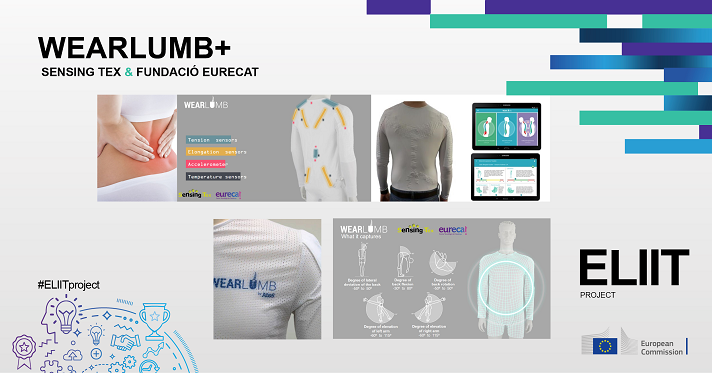Key facts
Sectors covered: Technological innovation in textiles and clothing
Innovation priority: Advanced digitised manufacturing, value chains and business models
Start: September 2021
ELIIT funding: €70 000
Introduction
Musculoskeletal disorders (MSDs) caused by occupational hazards - especially those affecting the lumbar the spine - are one of the most serious and persistent public health and socio-economic problems among several categories of workers in the EU.
Many MSDs can be prevented by ergonomic interventions that assess risk factors and modify work activities and workplaces accordingly. EU and Member State law has already enforced the requirements to take such steps. Companies thus have legal obligations in this area. However, they need tools that provide accurate, real-time information on postural habits to ascertain risk levels and propose preventive measures for workers.
What's the goal?
To detect the early signs of postural problems, the WEARLUMB project partners created a wearable textile for to monitor workers in a non-invasive way through real-time data measurement.
The WEARLUMB wearable is owned by the Eurecat technology centre, which developed it in cooperation with the ATOS Group and SGS. Under the WEARLUMB+ project, the technology transfer from Eurecat to Sensing Tex will allow the manufacturing process to be refined and scaled up, to demonstrate the product's effectiveness in an operational environment. The transfer will also make it easier to identify business opportunities by using the partnership’s expertise to set up a commercial structure and bring the product to market.
Key challenges
Among the main challenges is the need to evaluate business opportunities in the field of ergonomic risk assessment, explore niches within the market and identify further opportunities.
Other challenges relate to the technical and legal aspects of the transfer. The partners must establish knowledge transfer processes that will allow the technology to be brought to market quickly. They also need to define the transfer strategy, lay down terms and conditions and draw up a final transfer agreement.
Regarding the roll-out, provider agreements must be concluded, production flow charts need to be created, manufacturing prototypes developed, quality testing performed and product and service pricing set.
How has ELIIT helped?
In the initial stage, the main benefit of ELIIT support was establishing cooperation between Eurecat and Sensing Tex. Sensing Tex has proven expertise in smart textile applications and is interested in integrating the WEARLUMB technology into its portfolio.
It has already taken the first steps towards commercialisation. We then developed the product further and adapted it for optimal commercialisation. We have already taken the first steps of creating a new market for this deep-technology product, which has proven to be quite a long-term process.
Meet the partners
Sensing Tex is a young company aiming to make soft, flexible and stretchable electronics more widely available. It works to unleash the potential of the Internet of Things and enhance technological capabilities in every application. From smart beds to clothes, Sensing Tex develops technology that enables people to communicate and interact with every object in their surroundings.
Fundació Eurecat is a technology research centre in Catalonia. It provides industry and businesses with expertise and technology advice, offering solutions to innovation needs and boosting competitiveness.
SME: Sensing Tex SL
Country: Spain
Founded: 2010
Tech provider: Fundació Eurecat
Country: Spain
Founded: 2015

